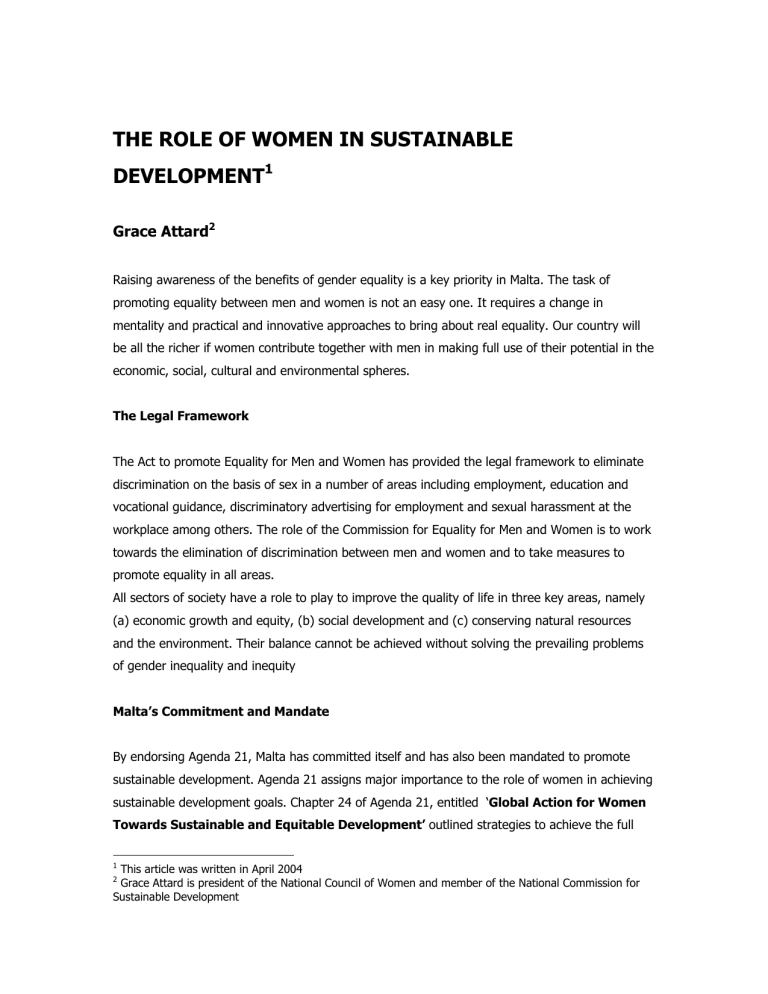THE ROLE OF WOMEN IN SUSTAINABLE DEVELOPMENT Grace Attard

THE ROLE OF WOMEN IN SUSTAINABLE
DEVELOPMENT
1
Grace Attard
2
Raising awareness of the benefits of gender equality is a key priority in Malta. The task of promoting equality between men and women is not an easy one. It requires a change in mentality and practical and innovative approaches to bring about real equality. Our country will be all the richer if women contribute together with men in making full use of their potential in the economic, social, cultural and environmental spheres.
The Legal Framework
The Act to promote Equality for Men and Women has provided the legal framework to eliminate discrimination on the basis of sex in a number of areas including employment, education and vocational guidance, discriminatory advertising for employment and sexual harassment at the workplace among others. The role of the Commission for Equality for Men and Women is to work towards the elimination of discrimination between men and women and to take measures to promote equality in all areas.
All sectors of society have a role to play to improve the quality of life in three key areas, namely
(a) economic growth and equity, (b) social development and (c) conserving natural resources and the environment. Their balance cannot be achieved without solving the prevailing problems of gender inequality and inequity
Malta’s Commitment and Mandate
By endorsing Agenda 21, Malta has committed itself and has also been mandated to promote sustainable development. Agenda 21 assigns major importance to the role of women in achieving sustainable development goals. Chapter 24 of Agenda 21, entitled ‘ Global Action for Women
Towards Sustainable and Equitable Development’ outlined strategies to achieve the full
1 This article was written in April 2004
2 Grace Attard is president of the National Council of Women and member of the National Commission for
Sustainable Development
and equal participation of women in order to bring about sustainable development. Its aim is to strengthen the role of women in sustainable development.
Malta together with other European countries is adopting a number of measures, in line with the
EU Sustainable Development Strategy, including gender mainstreaming in social protection and social inclusion, gender equality in employment to promote stable and quality employment for all women and men who are capable of working. Policies are being developed to promote reconciliation of work and family life including the provision of child-and dependent- care.
Existing gaps
However in Malta, there are major gaps and emerging issues that need to be addressed. These include the need to integrate gender concerns and to mainstream gender issues into development policies. There is also the need to enhance women’s participation in decision and policy making.
The government, the business community, non-governmental organizations and trade unions should promote gender equality. Towards this end there is the need to challenge and change negative and stereotypical attitudes and assumptions regarding female participation in decision making and policy making. In this regard it is imperative to sensitise members of these organizations to the need for equal opportunities for women and men and the positive benefits that women bring to the work place
The National Commission for Sustainable Development
With the setting up of the National Commission for Sustainable Development in 2002, in terms of the Environment Protection Act (2001) Malta took the first steps to develop a sustainable development strategy. One of the specific tasks of the Commission is ‘to prepare a national strategy for sustainable development’ which also includes gender perspective.
The National Commission for Sustainable Development will be launching a consultative process on a Sustainable Strategy for Malta during a one day seminar to be held on Saturday April 24 at the Corinthia San Gorg, St Julians. The strategy will address the issue of gender equality, and it is imperative that those who have this issue at heart, participate in the conference, and therefore in the formulation of this strategy.
The conference is open to all and is free of charge. Participants are requested to fill in al application form which is available at www.mrae.gov.mt/ncsdform.asp
More information can be obtained on 2295 2126
The consultative process is intended to lead to the drawing up of a Sustainable Development
Strategy over a period of five months, and will consist of two national conferences and a series of community meetings aimed at fostering public participation in the process.





